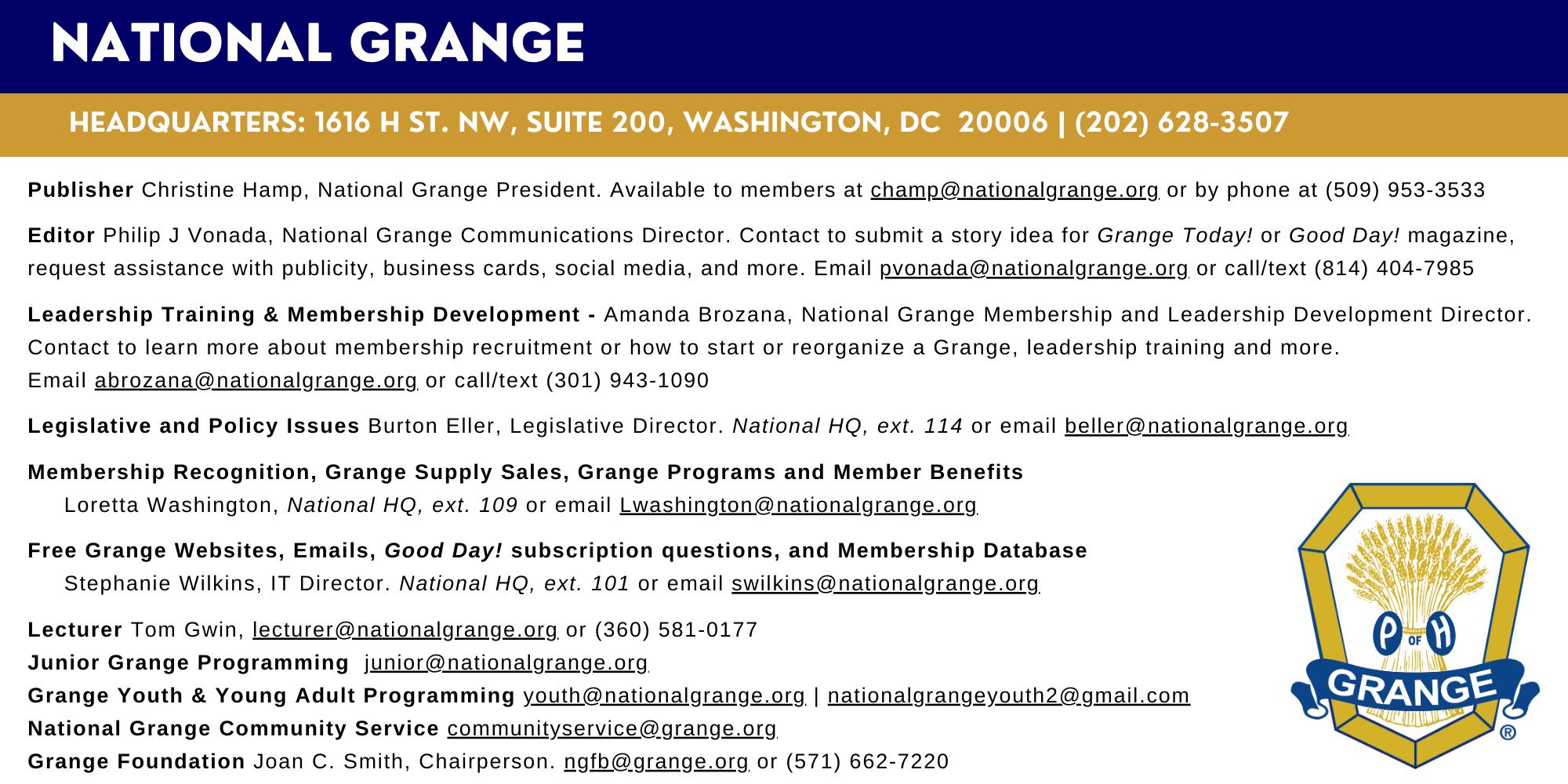

Summer Fairs provide chance to highlight rural mental health
by Pete Pompper
National Grange rep, Rural Minds Partnership Council
Hello Grangers,
I hope your summer is going well. I know many Granges are in the process of planning and running their Grange Fairs or are planning booths and exhibits for your local fairs. As you make these plans, I hope you can find a space to include information on the Rural Mental Health Resilience Program, a collaborative effort between the National Grange and our partners at Rural Minds. Your Grange has an amazing opportunity to disseminate this information to those who may be struggling with mental health issues.
We know that people living in rural America are struggling and may not have the resources to get the help they seek. A family member or friend walking past your booth likely knows someone who is struggling. This program could be the key to finding and providing the information to help them through their struggles. We need to keep working to
erase the stigma of mental health issues and, more importantly, the stigma of seeking help.
As Grangers, we work every day to strengthen our communities where we live and work. This is another opportunity to do just that.
Visit http://ruralminds. org/resilience to find all the information you can print to provide at your fairs. Whether it is a one-day festival or a weeklong fair, I hope you will utilize this program and have these available for the attendees.
The Rural Mental Health Resilience program is designed so you can use as many of the different materials as you wish. They are designed to be used as handouts with information for someone who may be struggling and needs to take the next step in seeking help. These are provided as free PDFs, so you can print as many as you need.
continued on page 3


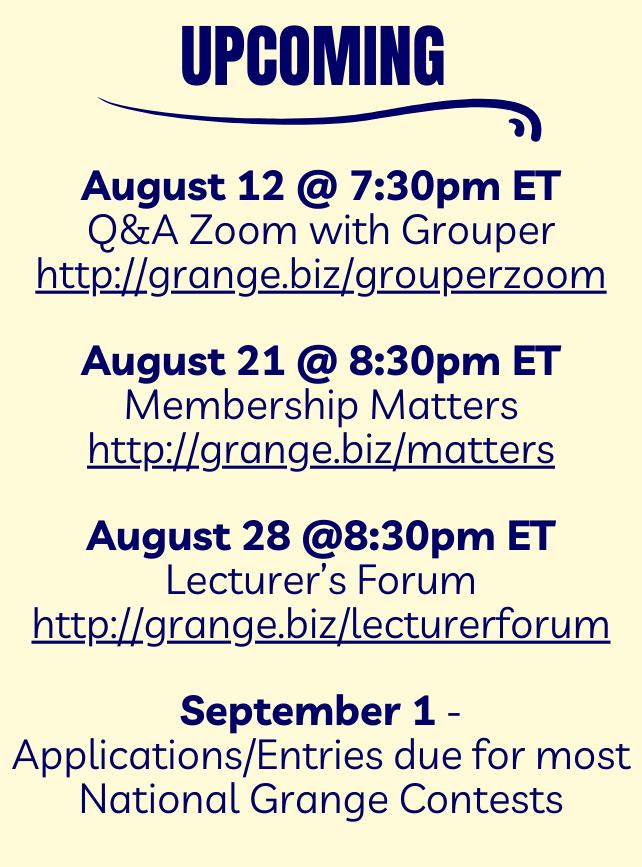
Perry County Pomona focuses on Youth in Ag
submitted by Doug Bonsall
Perry County Pomona Grange #69 (PA)
The Perry County Pomona Grange #69 (PA), with its four local Subordinate Granges, has adopted services to youth as its major community outreach.
Over the past several years, Perry County Pomona has sponsored two major projects each spring, reaching hundreds of children and youth in this rural southcentral Pennsylvania county. As each event has grown, other agriculture-related groups, individuals, and businesses have stepped up to provide financial and manpower support for these Grange initiatives.
Ag Day 2024, an immersive day-long field trip experience held on the county fairgrounds, brought together some 475 elementary students from four nearby school districts to learn about the impact of agriculture on their lives. A series of learning stations, planned and staffed by FFA members, explored topics like food production, plant care, animal husbandry, invasive insects, farm safety, pollinators/butterflies, and dairy promotion.
The Grange also packed and distributed 600 healthy bag lunches for all students and adult volunteers. Cash awards totaling $900 were presented to the winning entries in an essay and poster contest on the theme “Feeding Our Families,
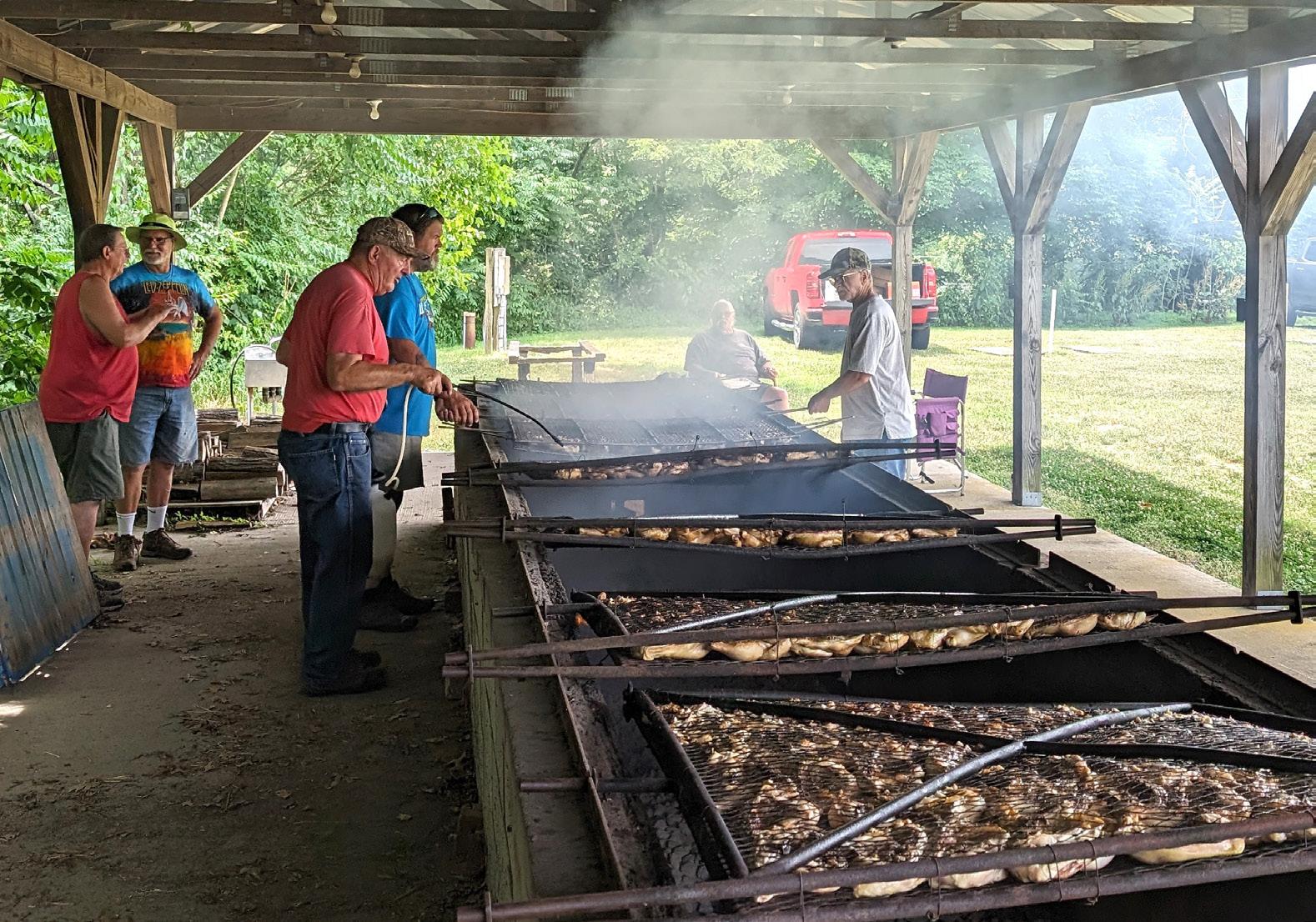
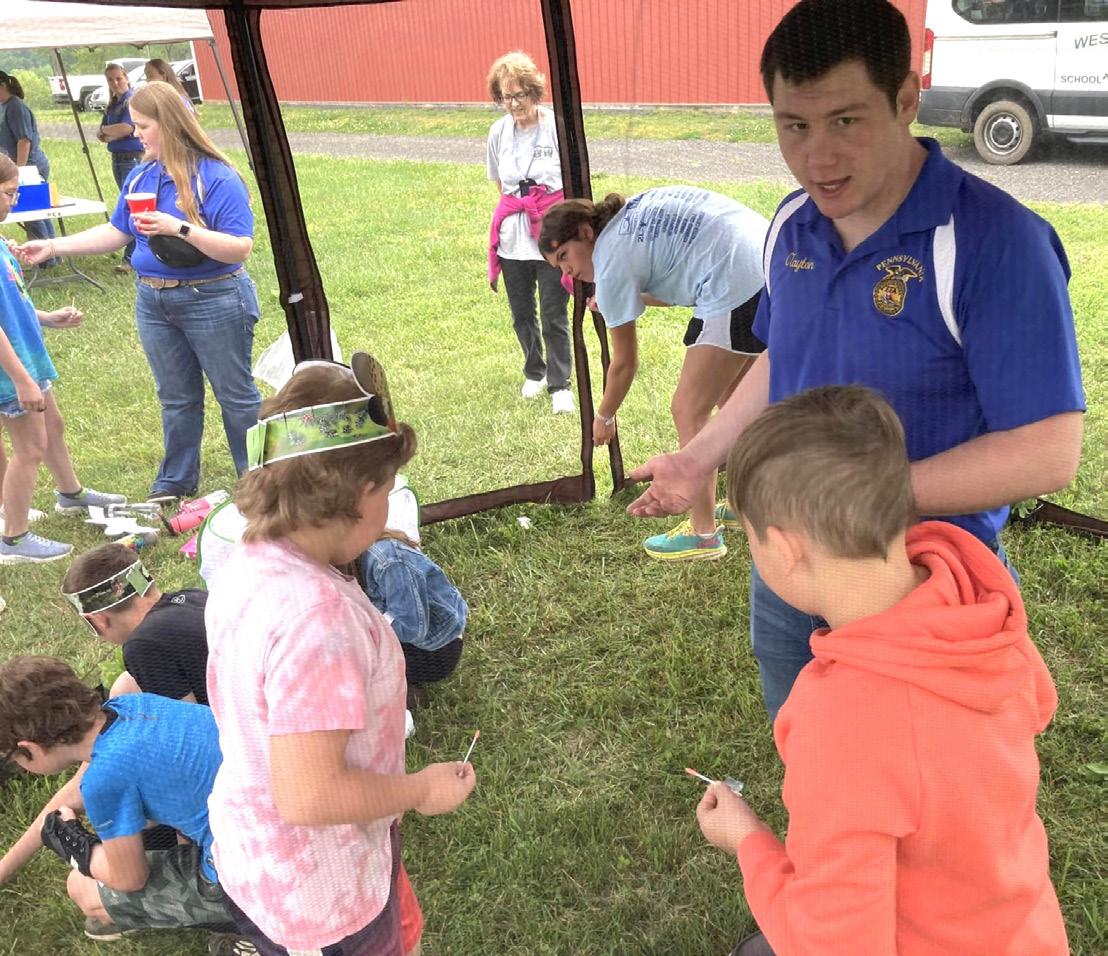
In June, a benefit chicken barbecue raises funds to support 4-H and FFA programs in the county, ensuring no student is denied participation due to family financial constraints. This year, 500 meals were prepared and served drive-through style by the Pomona Grange and 4-H, FFA, and Moose Lodge members and community friends. The proceeds of over $5,000 will be used to pay 4-H and FFA membership fees and provide direct support to the local programs of each organization.
Both projects have made a positive impact on the lives of youth and raised the profile of the Grange within the community.
The Ag Day butterfuly tent was a favorite, allowing students in feed and interact with these beautiful pollinators. Photo submitted
Grange and Moose Lodge volunteers barbequed 500 halves of chicken for the Perry Pomona 4-H and FFA benefit. Photo submitted
Rural Mental Health
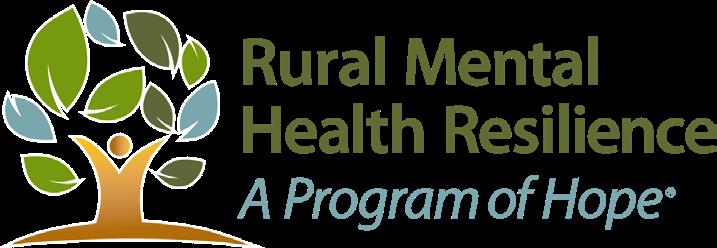
An optional suggestion would be to create a display similar to what Rural Minds showcased at the 2023 National Grange Convention (see photo at right). They printed one copy of several materials to display in plexi document frames. The program flyers were printed and available as takeaways, and they included a QR code linking to the program webpage.
Rural Minds also handed out wallet cards (business cards promoting the program, which include the website address and QR code), which could also be printed as an option. These are great for folks to pick up
continued from page 1
something easy to put in their pocket and provide the website address for the program to access and print any or all of the documents at home.
If you have any questions or if you display the information sheets at your fair, please email me at Mbeachgranger@gmail. com
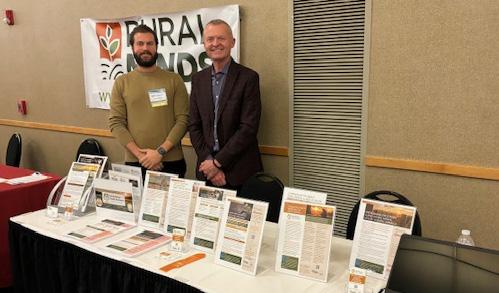
Fundraiser benefits local fire company
submitted by Mike Adams
Hamburg Grange #2103 (PA)
On March 23, 2024, the Hamburg Grange #2103 (PA) was held an all-you-can-eat Pennsylvania Dutch-style Chicken Pot Pie Dinner at the Hamburg Area High School, which sold out in under two hours. In total, we served 464 units, which included people that ate in-person or purchased take-out meals or quarts.
We want to THANK the
Hamburg School District for allowing us to hold this worthwhile event so that we could present a check of $4,000 to the Hamburg Union Fire Company #1.
Hamburg Grange also says THANKS to the 17 Hamburg Grange members, the other 20 volunteers, that helped, including a Helping Hands Group, and to Thrivent for the financial donation of $250 to make this event successful!
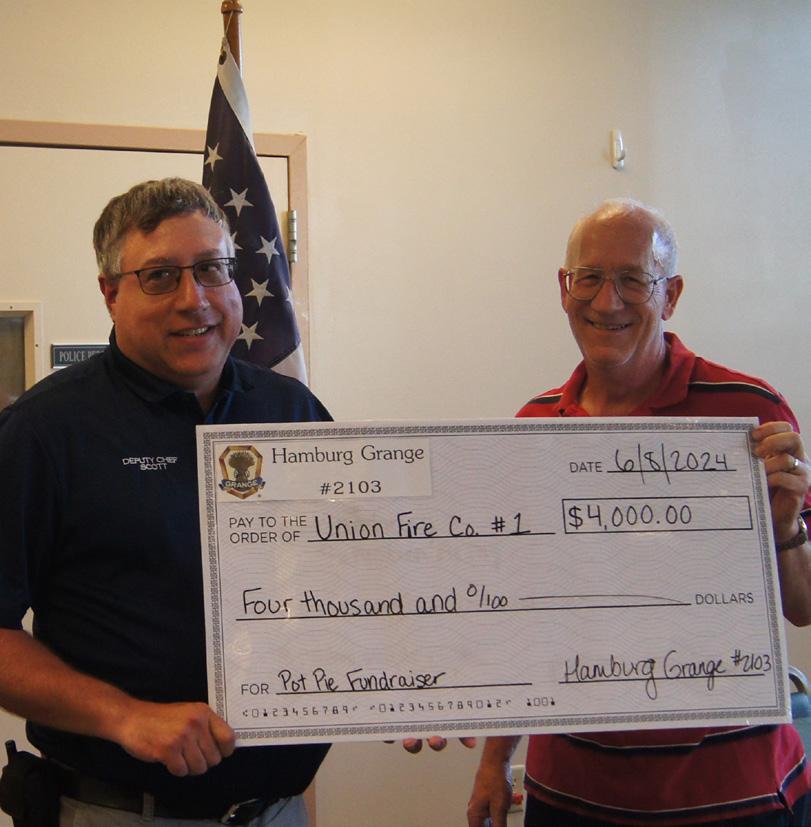
Patrick Fannon and Rural Minds Founder/CEO Jeff Winton pose with their exhibit at the 157th National Grange Convention in Niagara Falls. Their display included many of the Rural Mental Health Resilience Program materials, and information on how to access the program online.
Photo provided by Rural Minds
Mike Adams, right, President of Hamburg Grange #2103 (PA), presents a check for $4,000 to Scott Thren, on left, Deputy Fire Chief and Treasurer of The Hamburg Union Fire Company No. 1. Funds were raised through a Chicken Pot Pie Dinner. Photo submitted
44 Distinguished Grange Applications Received
The National Grange received 44 applications from Community, Pomona, and State Granges to be recognized as Distinguished Granges this year. Applications are currently being reviewed. All Granges who qualify will receive a notification by August 30 letting them know of their achievement.
• Bennett Valley #16 (CA)
• Bethlehem #137 (NY)
• Big Knob #2008 (PA)
• Burns #160 (MI)
• Central Union #559 (CA)
• Clackamas County Pomona #1 (OR)
• Columbus #58 (NJ)
• County Line #1751 (IL)
• Creswell #496 (OR)
• Eagle #1 (PA)
• Fairview #2177 (IN)
• Five Mile Prairie #905 (WA)
• Gardner #68 (KS)
• Goldendale #49 (WA)
• Grantham #968 (NC)
• Gratiot #1898 (MI)
Congratulations to all Granges who submitted applications! Please review the list below; if your Grange is missing, but you believe it should be included, please contact Loretta Washington at lwashington@nationalgrange.org no later than August 16.
• Hamburg #2103 (PA)
• Harveys-Aleppo #1444 (PA)
• Hookstown #1980 (PA)
• Jefferson #1384 (PA)
• Linganore #410 (MD)
• Lorane #54 (OR)
• Marys River #685 (OR)
• New Market #362 (MD)
• Prairie #1832 (IL)
• Prices Fork #786 (VA)
• Progress #96 (PA)
• Redland #796 (OR)
• Rio Linda #403 (CA)
• Russellville #91 (PA)
• Springwater #236 (OR)
• Stanford #808 (NY)

• Sterling #53 (MA)
• St. John’s #729 (NC)
• St. Joseph/Cass/Kalamazoo Pomona #4 (MI)
• Stony Point #1964 (PA)
• Thurmont #409 (MD)
• Turkey Hill #1370 (IL)
• Upton #125 (MA)
• Valley #1360 (PA)
• Maryland State Grange
• North Carolina State Grange
• Oregon State Grange
• Pennsylvania State Grange

National Grange & Rural Minds Present Webinar
The National Grange and Rural Minds are pleased to present our second webinar in a threewebinar series about the Inflation Reduction Act and rural America. Everyone is invited to join us for this free webinar, “The Impact of the Inflation Reduction Act on New Treatments for Mental Illness,” on Wednesday August 21, 2024 at 1:00pm ET / 10:00am PT. Register for this webinar at https://www.ruralminds.org/ rural-mental-health-connectionswebinar.
The Inflation Reduction Act (IRA) includes price-setting provisions that will result in less research for new medicines that can be prescribed in a pill
or capsule form. Known as the “pill penalty,” this one piece of the IRA threatens the development of future breakthrough drugs that treat mental illnesses, cancer, and many other diseases. Featuring a presentation from Candace DeMatteis, Policy Director for the Partnership to Fight Chronic Disease, this 45-minute webinar will explain the “pill penalty” and discuss its negative impact on access to mental health treatments for patients in rural America, as well as for all patients who prefer the convenience of taking medication in the form of pills or capsules.
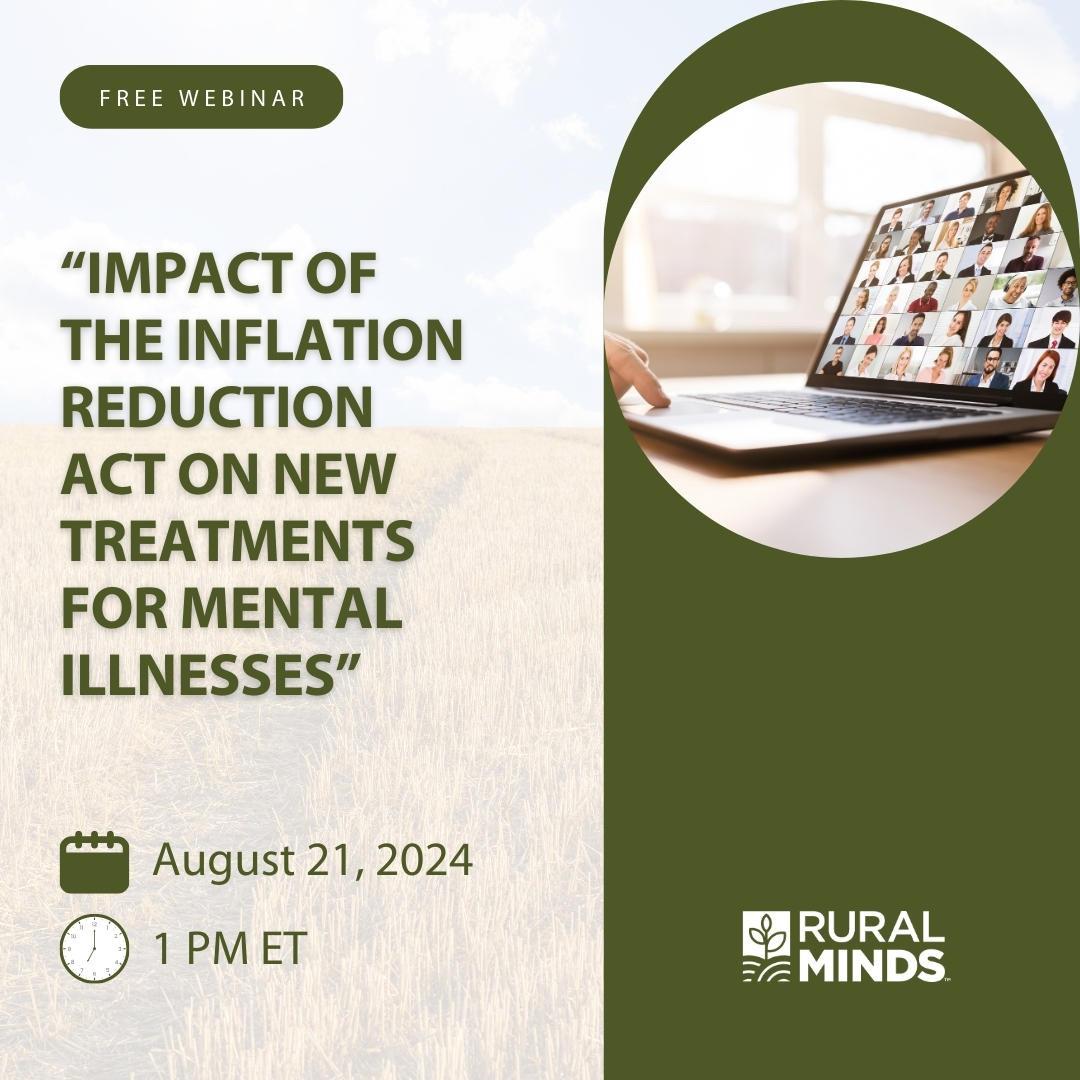
If you missed the first webinar, “Medicare Prescription Drug Coverage - Changes Under the Inflation Reduction Act,” you can watch it at https://www.youtube. com/@ruralminds5938
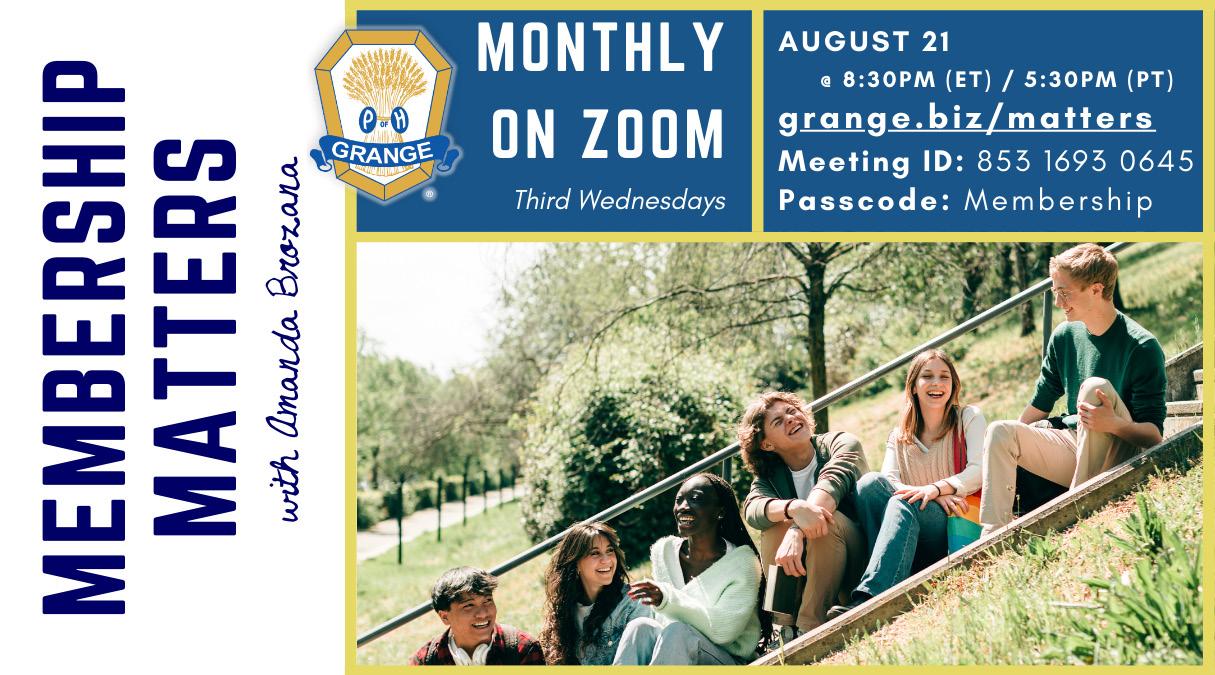
Verifying facts in the age of AI – librarians offer 5 strategies
By Tracy Bicknell Holmes, Library professor, Boise State University
Elaine Watson, Librarian and Associate Professor, Boise State University and Memo Cordova, Library associate professor, Boise State University via The Conversation
related to the topic? What else have they written? Who funds the organization and what are their affiliations? Do any of these affiliations reveal a potential conflict of interest? Might their writings be biased in favor of one particular viewpoint?
The phenomenal growth in artificial intelligence tools has made it easy to create a story quickly, complicating a reader’s ability to determine if a news source or article is truthful or reliable. For instance, earlier this year, people were sharing an article about the supposed suicide of Israeli Prime Minister Benjamin Netanyahu’s psychiatrist as if it were real. It ended up being an AI-generated rewrite of a satirical piece from 2010.
The problem is widespread. According to a 2021 Pearson Institute/AP-NORC poll, “Ninety-five percent of Americans believe the spread of misinformation is a problem.” The Pearson Institute researches methods to reduce global conflicts.
As library scientists, we combat the increase in misinformation by teaching a number of ways to validate the accuracy of an article. These methods include the SIFT Method (Stop, Investigate, Find, Trace), the P.R.O.V.E.N. Source Evaluation method (Purpose, Relevance, Objectivity, Verifiability, Expertise and Newness), and lateral reading.
Lateral reading is a strategy for investigating a source by opening a new browser tab to conduct a search and consult other sources. Lateral reading involves cross-checking the information by researching the source rather than scrolling down the page.
Here are five techniques based on these methods to help readers determine news facts from fiction:
1. Research the author or organization
Search for information beyond the entity’s own website. What are others saying about it? Are there any red flags that lead you to question its credibility? Search the entity’s name in quotation marks in your browser and look for sources that critically review the organization or group. An organization’s “About” page might tell you who is on their board, their mission and their nonprofit status, but this information is typically written to present the organization in a positive light.
The P.R.O.V.E.N. Source Evaluation method includes a section called “Expertise,” which recommends that readers check the author’s credentials and affiliations. Do the authors have advanced degrees or expertise
If any of this information is missing or questionable, you may want to stay away from this author or organization.
2. Use good search techniques
Become familiar with search techniques available in your favorite web browser, such as searching keywords rather than full sentences and limiting searches by domain names, such as .org, .gov, or .edu.
Another good technique is putting two or more words in quotation marks so the search engine finds the words next to each other in that order, such as “Pizzagate conspiracy.” This leads to more relevant results.
In an article published in Nature, a team of researchers wrote that “77% of search queries that used the headline or URL of a false/misleading article as a search query return at least one unreliable news link among the top ten results.”
A more effective search would be to identify the key concepts in the headline in question and search those individual words as keywords. For example, if the headline is “Video Showing Alien at Miami Mall Sparks Claims of Invasion,” readers could search: “Alien invasion” Miami mall.

Photo by Debalina, licensed via AdobeStock
3. Verify the source
Verify the original sources of the information. Was the information cited, paraphrased or quoted accurately? Can you find the same facts or statements in the original source? Purdue Global, Purdue University’s online university for working adults, recommends verifying citations and references that can also apply to news stories by checking that the sources are “easy to find, easy to access, and not outdated.” It also recommends checking the original studies or data cited for accuracy.
The SIFT Method echoes this in its recommendation to “trace claims, quotes, and media to the original context.” You cannot assume that re-reporting is always accurate.
4. Use fact-checking websites
Search fact-checking websites such as InfluenceWatch.org, Poynter.org, Politifact.com or Snopes.com to verify claims. What conclusions did the fact-checkers reach about the accuracy of the claims?
A Harvard Kennedy School Misinformation Review
article found that the “high level of agreement” between fact-checking sites “enhances the credibility of fact checkers in the eyes of the public.”
5. Pause and reflect
Pause and reflect to see if what you have read has triggered a strong emotional response. An article in the journal Cognitive Research indicates that news items that cause strong emotions increase our tendency “to believe fake news stories.”
One online study found that the simple act of “pausing to think” and reflect on whether a headline is true or false may prevent a person from sharing false information. While the study indicated that pausing only decreases intentions to share by a small amount –0.32 points on a 6-point scale – the authors argue that this could nonetheless cut down on the spread of fake news on social media.
Knowing how to identify and check for misinformation is an important part of being a responsible digital citizen. This skill is all the more important as AI becomes more prevalent.


Grange Member Benefit - introducing Grouper
We are thrilled to announce our new partnership with Grouper, a social fitness movement that supports healthy living through social connections.
By joining Grouper, eligible members can earn a $50 payment for signing up and $20 every three months for staying active in Grange community projects and gatherings.

Join our Live Q&A Session to learn more and get your questions answered directly from Grouper and Grange representatives.
Date: August 12th | Time: 7:30 PM ET / 4:30PM PT | Join via Zoom: grange.biz/grouperzoom
To see if you qualify for these benefits, visit hellogrouper.com/grange. For any questions, contact the Grouper Member Engagement Team at 833-445-2400 or info@hellogrouper.com.

